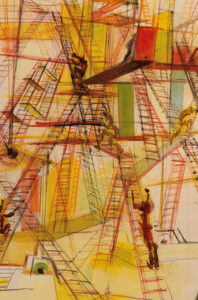New Babel. Challenges of the Plural World.
International Conference
November 4-5, 2021 Barcelona, Catalonia
Organizing Team
Organized by: Faculty of Geography and History, Department of Art History, Universitat de Barcelona
Program
Thursday 4 November 2021
Aula Magna (4th floor), Faculty of Geography and History, University of Barcelona.
10-10:15h: Welcome Anna Maria Guasch (AGI, University of Barcelona)
10.15-10.35h: María Bendito (AGI, University of Barcelona)
10.45 – 11.30h: Keynote Isabel Valverde (Pompeu Fabra University, Barcelona), Babel en los Salones: algunas miradas sobre París capital de las artes (on site)
11.30-11.40h: Questions & Remarks
11.40-12h: Coffee break
12-12.20h: Maria Souza (University of Barcelona), When Berlin Became Babylon: Art and Politics in the Weimar Period (online)
12.25-12.45h: Joanna Sobesto (Jagiellonian University, Poland), Towards the deconstruction of a New Babel: translation history as an interdisciplinary approach to regain voices of the silenced the case of female translators in interwar (1918-1939) Poland (online)
12.50-13.10h: Emil Becerril (Independent Researcher), Frente a una política del presente: tensiones entre historia, tiempo y actualidad (online)
13.15-13.30: Questions & Remarks
16-16.40h: Keynote Anthony Cascardi (Berkeley, University of California), ‘The Society of the Spectacle,’ Thoughts and Afterthoughts (online)
16.40-16.50h: Questions & Remarks
16.45-17.05: Marco Tondello (Independent Researcher), Arte relacional 2.0: ser social en la época de las redes sociales (on site)
17.05-17.20h: Break
17.20-17.40h: Lisa Deml (Birmingham City University), Proxy Witnessing: Affection and Intimacy within Global Broadcasts of the Syrian Conflict (on site)
17.45-18.05h: Frente Sudaka (Indenpendent Researchers), Intervenir el presente: prácticas resistentes y contranarrativas transterritoriales (on site + online)
18.10-18.40h: Keynote Marcelo Expósito (on site)
18.55h: Questions & Concluding remarks
Friday 5 November 2021
10.30-11.10h: Keynote Joan Sureda (University of Barcelona), El rayo de lo sublime (on site)
11.10-11.20: Questions & Remarks
11.25-11.45: Cristina Moraru (National University of the Arts, Romania), Contemporary Art in Times of Global Crisis. New Art Historization Practices ‘After the Global’ (online)
11.50-12.10h: Tommaso Durante (University of Melbourne, Australia), Global Challenges and Visual Strategies of Domination (online)
12.15-12.35h: Rhea Dehn Tutosaus (Technical University, Darmstadt), Hacerse (in)visible. Cuerpos, Mercancías y Textiles como Experiencias Fronterizas (on site/online)
12.40-13h: Questions & Remarks
16-16.40h: Keynote Francisco Jarauta (University of Murcia), Nosotros, habitantes de Babel (on site)
16.40-16.50h: Questions & Remarks
16.55-17.15: Graciela Montaldo (Columbia University, New York), Migrantes: traducir la experiencia, traducir la violencia (online)
17.20-17.40h: Mark Aitken (Central St Martins, London), Confinement as a measure of freedom in the ‘new normal’ (on site)
17.45-18.05h: Kelley Tialiou (Independent Researcher), Greece as New Babel: Displacement and the Cosmopolitan Aesthetics of Demetris Koilalous (online)
18.10-18.30h: Questions & Concluding remarks
 Historically, the myth of Babel has assumed responsibility for the geographical, cultural, and linguistic division. Moreover, it is proposed as an explanatory account of the origins of the concept of social. It represents the longing for the conquest of the utopian heaven and the consequent seizure of power to exercise a new order and subjugation; an attitude sanctioned by division, confusion, and diaspora. This historical problem, which in myth has its origin in the Judeo-Christian hermeneutic, explains, in the same way, many other historical phenomena such as that of translation understood as a tool of homogenization, restitution of unity and the penultimate of the exegeses of myth.
Historically, the myth of Babel has assumed responsibility for the geographical, cultural, and linguistic division. Moreover, it is proposed as an explanatory account of the origins of the concept of social. It represents the longing for the conquest of the utopian heaven and the consequent seizure of power to exercise a new order and subjugation; an attitude sanctioned by division, confusion, and diaspora. This historical problem, which in myth has its origin in the Judeo-Christian hermeneutic, explains, in the same way, many other historical phenomena such as that of translation understood as a tool of homogenization, restitution of unity and the penultimate of the exegeses of myth.
Starting with the ideas of conquest, punishment, difference and dispersion as its primary meanings, the meaning of Babel has expanded through the different historical phases until reaching our contemporary times. This multiplication of meanings begins to become visible in parallel to the disintegration of the medieval theological world that had sustained its representation and meaning until the 16th century, to become a pictorial and literary object, transforming the tower of Genesis into a civil image, a permeable and undefined symbol of multiple identities.
From this moment on, Babel has served as a semantic framework for subsequent historical processes: from the exploration of the New World in the 16th century as the origin of global cartography, through thentechnological revolution of the 19th century, the commercial conquest of the sky in the 20th century, to the invasion of the virtual in life processes in the 21st. All these forms of reversing the imposed order have attacked the preconceived limits and the structures that sustained them. Today they confirm that all those spaces that had formerly been reserved for inexplicable phenomena or divinity have been invaded by human beings to the point of revealing their weaknesses and natural finitude.
In this prolonged diachrony, Babel remains a nuclear explanation for the why and how of the present day. Our current historical paradigm, which we call Globalization, has appeared as an attempt to twin the multiculturality that was mythologically born in Babylon. On the other hand, and as far as the visual formulation of the myth is concerned, the ubiquity and horizontal expansion of the virtual network has replaced the physical materiality of the tower and its aspiration and representation of the vertical axis.
However, Globalization as a process especially present in the western geography of the planet, which has built so many vertical, national, racial, identity and historical towers of Babel, has proved futile, with great weaknesses, gaps and limits in the face of the latest global vicissitude, a pandemic that has swept horizontally and without hierarchies. Globalization or New Babel is thus presented as a new historical order, which, we might think, has not yet been realized.
On this basis, the symposium aims to open a debate around various questions that will enable us to:
– re-conceptualize the ideas of social models, national identity, limits, transgressions?
– to think about current social dynamics and their translation into artistic practices
– relativize national approaches in favor of global cartographies
– decompose the hierarchical, chronological, or formal reading of history
– to expose examples of studies/practices based on the rhizomatic/cartographic model
– explore the potential of disorder and simultaneity as new methodologies
– reconsider cultural multiplication and difference as a valid social schema
– rethink the utopia/dystopia semantic arc today
– to hypothesize on Globalization as a real or transitional scenario
– to point out the value of the COVID-19 pandemic in the construction of a new social model
– to expose the evolutionary mismatch between technological development and policy management in our current scenario
Venues
UB, Universitat de Barcelona / Aula Magna
Montalegre 6, 4th Floor, 08001 Barcelona, Catalonia
www.ub.edu
Onsite + online event (via ZOOM)
